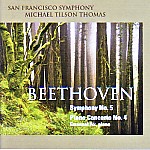These two pieces go well together: both have first movements based on the same four-note motive, but Beethoven puts it to very different expressive use. It’s also interesting to hear Michael Tilson Thomas’ take on music that, in the case of the symphony, he (not very persuasively) recorded many years ago for Sony with the English Chamber Orchestra. He’s much weightier now (though not unduly slow), which is all to the good, and the orchestra plays magnificently. Textures are incredibly transparent, bass lines gratifyingly clear (check out the finale). What is missing, however, is any sense of struggle–the first movement lacks tension and power, and sounds a bit stiff. The finale is suitably triumphant, and the coda excellently done, but too legato. Accents aren’t punched out with sufficient force. A very beautiful Andante is a plus, a scherzo totally lacking in menace a minus.
The concerto’s first movement seems to offer more of the same. Emanuel Ax spreads his opening chord–a questionable if interesting choice–then plays dutifully but prettily thereafter. The second movement, though, is marvelous, a true dialog between contrasting characters. Thomas finds an ideal tempo to characterize the strings, and Ax’s replies convey the piano’s other-worldliness in a marginally different, dreamy tempo that doesn’t chop the music into disconnected bits. The finale is wholly excellent: fast, exciting, and lyrically affecting, while the engineering is very well-balanced. This disc has lots of fine playing from both soloist and orchestra, but turns out to be only fitfully moving despite some great moments.
































